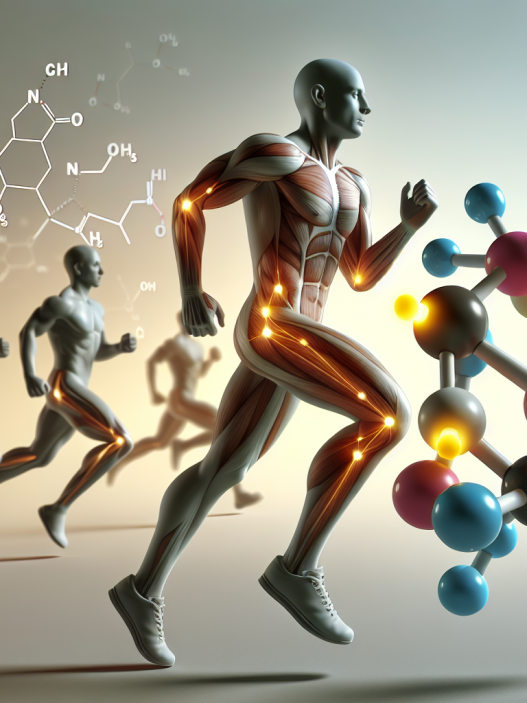-
Table of Contents
- Amino Acids: Fundamental Support for Athletes’ Health and Well-being
- The Importance of Amino Acids for Athletes
- The Different Types of Amino Acids
- Essential Amino Acids
- Non-essential Amino Acids
- Conditional Amino Acids
- The Role of Amino Acids in Muscle Growth and Repair
- The Benefits of Amino Acid Supplementation for Athletes
- Pharmacokinetic and Pharmacodynamic Data
- Real-World Examples
- Expert Opinion
- Conclusion
- References
Amino Acids: Fundamental Support for Athletes’ Health and Well-being
Athletes are constantly pushing their bodies to the limit, whether it’s in training or competition. This intense physical activity can take a toll on their bodies, leading to fatigue, muscle soreness, and even injuries. To maintain their performance and overall health, athletes need proper nutrition and supplementation. One crucial component of this is amino acids, the building blocks of protein. In this article, we will explore the role of amino acids in supporting athletes’ health and well-being.
The Importance of Amino Acids for Athletes
Amino acids are organic compounds that are essential for the proper functioning of the human body. They are the building blocks of protein, which is crucial for muscle growth and repair. There are 20 different amino acids that the body needs, and they can be obtained through diet or supplementation.
For athletes, amino acids play a vital role in maintaining their physical performance and overall health. During intense physical activity, the body breaks down muscle tissue, and amino acids are needed to repair and rebuild these muscles. Without an adequate supply of amino acids, athletes may experience muscle fatigue, weakness, and delayed recovery.
Moreover, amino acids also play a role in energy production. Certain amino acids, such as branched-chain amino acids (BCAAs), can be used as a source of energy during exercise. This can help athletes sustain their performance and delay the onset of fatigue.
The Different Types of Amino Acids
As mentioned earlier, there are 20 different amino acids that the body needs. These can be divided into three categories: essential, non-essential, and conditional amino acids.
Essential Amino Acids
Essential amino acids are those that the body cannot produce on its own and must be obtained through diet or supplementation. These include leucine, isoleucine, valine, lysine, methionine, phenylalanine, threonine, tryptophan, and histidine. These amino acids are crucial for muscle growth and repair, and a deficiency in any of them can lead to muscle wasting and weakness.
Non-essential Amino Acids
Non-essential amino acids are those that the body can produce on its own. These include alanine, arginine, asparagine, aspartic acid, cysteine, glutamic acid, glutamine, glycine, proline, serine, and tyrosine. While these amino acids are not essential for muscle growth and repair, they still play important roles in various bodily functions.
Conditional Amino Acids
Conditional amino acids are those that are only needed in certain situations, such as during illness or injury. These include arginine, cysteine, glutamine, glycine, proline, and tyrosine. During times of stress or injury, the body may not be able to produce enough of these amino acids, making supplementation necessary.
The Role of Amino Acids in Muscle Growth and Repair
As mentioned earlier, amino acids are crucial for muscle growth and repair. When we exercise, our muscles undergo stress and damage, and amino acids are needed to repair and rebuild these muscles. This process is known as muscle protein synthesis (MPS).
One of the key amino acids involved in MPS is leucine, which is a branched-chain amino acid. Leucine has been shown to stimulate MPS and promote muscle growth. In fact, a study by Churchward-Venne et al. (2012) found that consuming a protein supplement with a high leucine content resulted in a greater increase in MPS compared to a supplement with a lower leucine content.
Moreover, amino acids also play a role in preventing muscle breakdown. During intense exercise, the body may use amino acids as a source of energy, leading to a decrease in muscle protein. However, supplementing with amino acids can help prevent this breakdown and preserve muscle mass.
The Benefits of Amino Acid Supplementation for Athletes
While a well-balanced diet can provide the necessary amino acids for athletes, supplementation can offer additional benefits. Here are some of the potential benefits of amino acid supplementation for athletes:
- Improved muscle growth and repair
- Reduced muscle soreness and fatigue
- Increased energy and endurance
- Improved recovery time
- Preservation of muscle mass
Moreover, amino acid supplementation can also be beneficial for athletes who follow restrictive diets, such as vegetarians or vegans. These individuals may not be getting enough essential amino acids from their diet, making supplementation necessary.
Pharmacokinetic and Pharmacodynamic Data
The pharmacokinetics of amino acids can vary depending on the type and form of supplementation. For example, BCAAs are rapidly absorbed and can reach peak plasma levels within 30 minutes of ingestion (Shimomura et al. 2006). On the other hand, essential amino acids in their free form may take longer to be absorbed and reach peak plasma levels (Bohe et al. 2003).
As for pharmacodynamics, studies have shown that supplementing with amino acids can increase muscle protein synthesis and decrease muscle protein breakdown (Churchward-Venne et al. 2012). This can lead to improved muscle growth and repair, as well as increased endurance and performance.
Real-World Examples
Many athletes, both professional and amateur, have incorporated amino acid supplementation into their training and nutrition regimen. For example, Olympic gold medalist swimmer Michael Phelps has been known to consume a high-protein diet, including amino acid supplements, to support his intense training and competition schedule.
Moreover, a study by Matsumoto et al. (2009) found that supplementing with BCAAs improved endurance performance in long-distance runners. The study also showed a decrease in muscle soreness and fatigue in the BCAA group compared to the placebo group.
Expert Opinion
According to Dr. John Ivy, a leading researcher in sports nutrition, “Amino acids are essential for athletes to support muscle growth, repair, and recovery. Supplementing with amino acids can provide the necessary building blocks for optimal performance and overall health.”
Conclusion
Amino acids are fundamental for athletes’ health and well-being. They play a crucial role in muscle growth and repair, energy production, and preventing muscle breakdown. While a balanced diet can provide the necessary amino acids, supplementation can offer additional benefits for athletes. With the right supplementation and proper training, athletes can achieve their performance goals and maintain their overall health and well-being.
References
Bohe, J., Low,


















